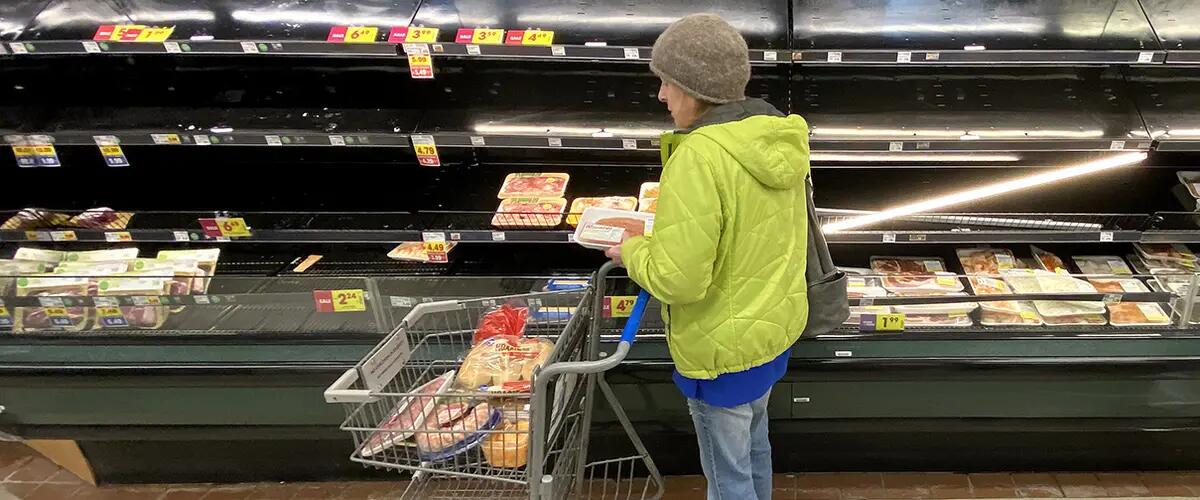
Meat was scarce in supermarkets after several processing plants closed due to Covid-19 cases among workers.
Professor: Covid-19 outbreak testing supermarket supply chains
Consumers continue to encounter one of the cascading effects of the Covid-19 outbreak at the supermarket, where products such as eggs, baby formula, paper towels and toilet paper have been in short supply. The scarcity of some products is a result of different factors, including the coronavirus-related shut-down of manufacturing plants and consumer hoarding.
Professor Rudi Leuschner, who teaches supply chain management at Rutgers Business School, said he believes most of the shortages are consumer driven and are likely to be short-lived. Here are some of his insights on why the grocery store supply chain has been disrupted and what may be the one lasting effect of the Covid-19 outbreak on the grocery shopping experience.
Q: How complex are the supply chains used by U.S. supermarkets?
A: Very complex. If you think about your average supermarkets, they carry about 40,000 different stock-keeping units. That’s not necessarily 40,000 different products, but it’s 40,000 different types of items at any given time in the store. That’s a regular supermarket. If you think about some of those big box stores like a Super Wal-Mart, that number could reach close to 100,000 stock-keeping units. You might have 5,000 to 10,000 different suppliers making these products, and sometimes there’s the retailer, and the retailers themselves might have a regional distribution center that they use to distribute goods from. They might even buy goods from a wholesaler who buys from the manufacturer. So, the supply chain is pretty long in a lot of cases.
Q: Can you talk about some of the ways the supermarket supply chain is being disrupted by Covid-19?
A: There are a couple of ways. Let’s start with the upstream side. We’ve seen examples of where milk suppliers were not able to sell to some of their other customers like schools and restaurants, so you already have a congestion in demand. That’s going to impact the milk supply in other ways. In some places, they had to dump milk because they couldn’t sell it, but it’s going to have a trickle-down effect on the milk that we’re buying. When we see that some of the stores are imposing restrictions and allowing consumers to buy only one container of milk at a time. When this happens, the companies didn’t necessarily have people who were sick, but the issues were demand driven because something happened further down the supply chain, and someone wasn’t able to buy their products anymore. If you’re a milk producer, nothing has changed for you, it’s just the demand that you had, you’re not seeing that, and it has sort of peaked into the other areas. There were stories where several meat operations had cases of Covid-19 among their workers and as a precaution they shut everything down and for a couple of weeks that had some impact. In other categories, like the paper towel and toilet paper category, we saw panic buying.
If you’re a paper towel manufacturer, your demand shouldn’t ever move unless you’re running promotions. Now, enter people panicking and they start buying more than they could possibly need. The increase in demand was five to 10 times the normal level in March. There’s no way anyone could have planned for that, so of course it was in short supply. That’s all consumer driven, but the after effect is now, I’m thinking every time I go to the store and I see some, I’m going to buy it just in case. Until people stop hoarding, there will be shortages because there’s only so much the manufacturers can do to raise production. A lot of these companies make other products and they can’t just shift their production to toilet paper. Another category, where I saw exactly the same thing, was baby formulas. It’s the same type of consumer behavior and same type of shortages. Another one might be where the items are essential in the health care industry, for example, cleaners and disinfectants, where the demand has been diverted to hospitals and medical facilities. As soon as hospitals feel like we’ve gotten through the worse of this, there will be more supply to everyday consumers.
Q: Do you see these long-time shortages occurring?

A: Unless we hear of a significant production shortage, these operations are pretty tuned to having the right level of demand. In the short term, because people are stocking up and buying so much, it’s going to have some effect. Right now, most people are also limiting their trips to the supermarket so when they go, they’re buying half the store. This should peter out once people feel confident that they can go back to the store more often and they’ll always be able to get more.
Q: What other effects is the pandemic having on supermarkets?
A: Where I live in Pennsylvania, we still have a couple of independently owned supermarkets. One was already planning to introduce online shopping. So, you place your order online and then you have to pick it up at the store. They soft launched it in February and now it’s up and running. You just pull through, they throw the bags in your trunk, close your trunk, and then you drive away. Another store, they’re doing more of a phone order system. The ability to place a grocery order and then pick it up is more convenient, especially in the country where I live. There are a lot of benefits for bringing digital technology into the grocery shopping experience.
-Susan Todd
Photo credit: Getty Images
Press: For all media inquiries see our Media Kit


